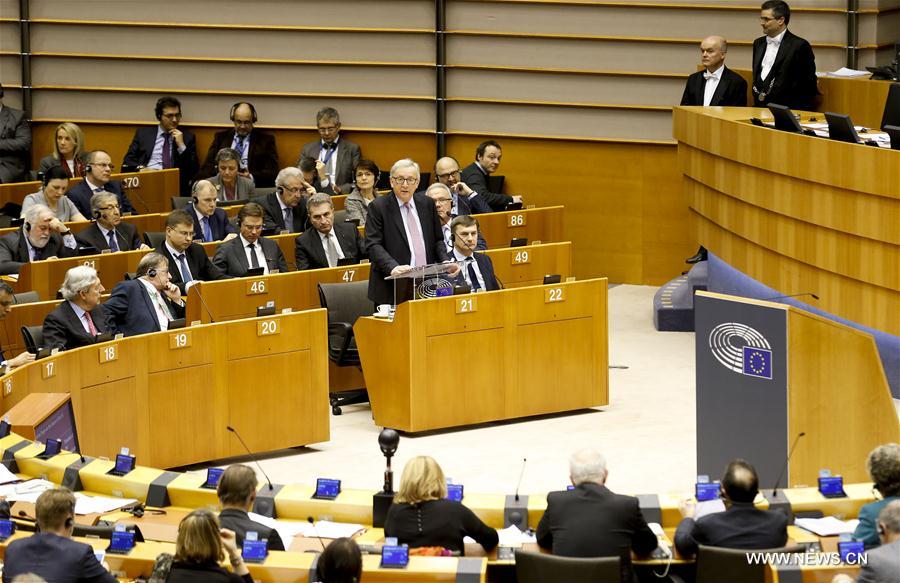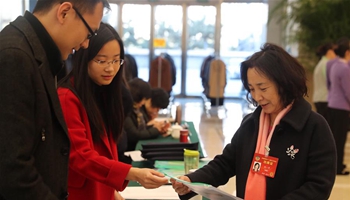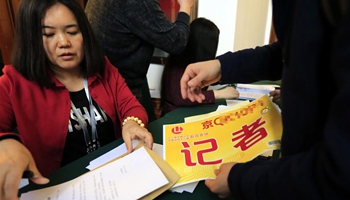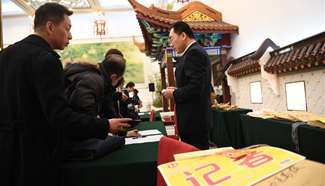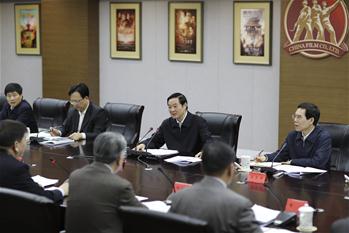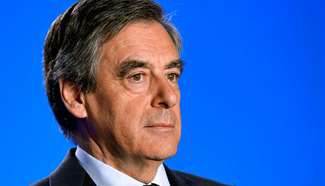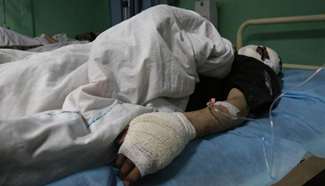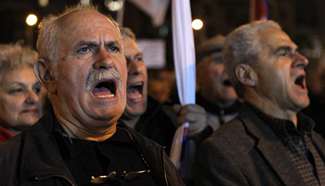European Commission President Jean-Claude Juncker (C) addresses the "White Paper on the Future of Europe" at the European Parliament, in Brussels, Belgium, March 1, 2017. (Xinhua/Ye Pingfan)
by Zhao Xiaona
BRUSSELS, March 1 (Xinhua) -- Lead members of European Parliament (MEPs) from political groups on Wednesday reacted to the European Commission's future of Europe white paper, presented by its President Jean-Claude Juncker, with mixed comments.
Opening the European Parliament plenary session here, Juncker sketched out five scenarios for the future of the European Union (EU) after Brexit.
The latest movement of the EU executive arm is a bid to define the future of the bloc. It was welcomed by some MEPs, while it was criticized by others for not picking a clear preferred path or providing concrete examples.
European Parliament's President Antonio Tajani urged that the future of Europe debate, begun by the three reports voted at previous plenary session, "must go on."
He stressed that the upcoming Rome Treaty 60th anniversary celebrations must be "an opportunity for the institutions to listen more closely to citizens, in order to address their concerns."
Esteban Gonzalez Pons, vice-chairman of the European People's Party (EPP), agreed with Juncker that the EU should have to "align expectations with reality" and urged member states to "stop blaming Europe for what Europe cannot do because it does not have the tools."
"It is time to defend Europe because it is the best vaccine against nationalists and populists," he said.
Representing the largest political group in the European Parliament, Pons asked for decisions on the future of the EU to be taken "in unity and with consensus" and underlined that the House must be "fully involved" in the subsequent debate.
Regarding the five scenarios presented by the European Commission for the future of the EU, Pons said the EPP believes "a sixth scenario could also be possible merging the other five, because they are not mutually exclusive."
"Nobody should forget that the Union is already our present, and now we have to decide which way we want to go in the future in order to deal with common challenges such as globalization, the generational gap, terrorism, climate change, the migration and refugee crisis, and the rise of nationalism and populism," he added.
The second largest political group in the European Parliament, the Socialists and Democrats group (S&D) called on Juncker to fight for a stronger, united and progressive Europe.
"We are disappointed with the European Commission white paper. We consider it a mistake to simply present five possible scenarios for the future of the European Union, instead of singling out a strong and comprehensive choice to fortify ourselves against the current storm we are facing," S&D leader Gianni Pittella said following Juncker's presentation
"The Socialists and Democrats only see one option: to work together as Europeans and do much more together, because together we are stronger," he stated. "We cannot accept the sacrifice of a common European future as a result of the short-sightedness of the Council or because of a fear of possible outcomes of national elections."
The third largest group in the European Parliament, the European Conservatives and Reformists group (ECR), said it believes the right future for Europe is neither a break-up nor a super state.
Responding to the white paper, Syed Kamall, leader of ECR group, said "Recent referendum results in Britain, Netherlands, Italy, Hungary and Denmark have shown a loss of faith in the EU. The ECR Group has always made it clear that the EU can restore confidence by reforming to become a community of nations cooperating in shared institutions in areas where they share common interests such as trade, the single market, energy, development or cross-border transport."
Kamall said the EU has lost its way though it has achieved a great deal in eliminating barriers, promoting prosperity and spreading stability.
"With major reform, decentralization and respect for our member states, the EU can move past the era of expensive sticking plasters over many cracks, and towards delivering its original promise for citizens of EU states," Kamall said.
Guy Verhofstadt, leader of the Alliance of European Liberals and Democrats group (ALDE), stressed the need to start a further inter-institutional reflection on the future of Europe.
He also said that the EU currently lacks real capabilities to address many of today's challenges, and urged EU countries to stop using the unanimous vote rule to block vital efforts to move the Union forward.
"We need to listen to the citizens," stressed Patrick Le Hyaric, vice president of the European United Left/Nordic Green Left group (GUE/NGL). He called for another "bottom-up" scenario, which takes account of people's aspirations for justice, equality, solidarity, environment protection and public health. "Otherwise, we'll fail to meet the challenge," he warned.
Philippe Lamberts, co-president of The Greens/European Free Alliance (Greens/EFA) urged the European Commission to consider proposing a radical change of direction, so as to halt the explosion of inequality.
"We need the EU institutions and the member states to change. As long as EU policy continues to benefit big conglomerates and not citizens, we will not regain their confidence. Although Jean-Claude Juncker has proposed several scenarios for the organization, it is clear that he wants to continue as before as much as possible. This will not convince people of the future of the European Union," he said.
For the Europe of Freedom and Direct Democracy (EFDD), a EU-skeptical political group, UK Independence Party member Gerard Batten said that the white paper recognizes the problems facing the EU, "but fails to understand that many of these were created by the EU in the first place."
Europe of Nations and Freedom (ENF) representative Dutch MEP Vicky Maeijer said that the EU is collapsing. "We in the Netherlands said no to the European constitution, no to the trade agreement with Ukraine, and it is time we said no to Europe."
The president of the European Commission Jean-Claude Juncker unveiled his plans on a "new chaper" of the Europe at the European Parliament plenary.
The so-called "pathways to unity" gives the EU's 27 members -- once Britain leaves in 2019 -- five broad choices to start considering at the March 25 summit in Rome when the EU marks 60 years of the bloc.
The options for the potential state of the Union by 2025 range from shrinking the scope of areas of cooperation among member states, maintaining the status quo, or a more ambitious scenario of taking steps towards a federalist EU.
